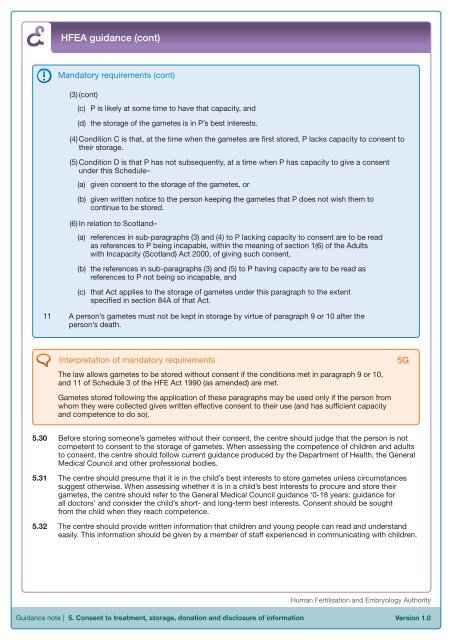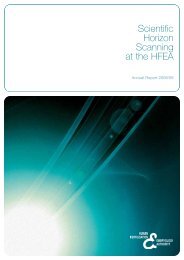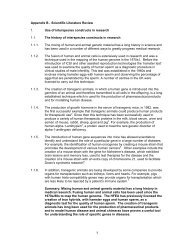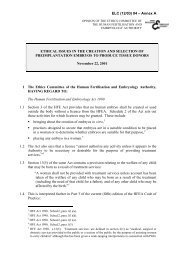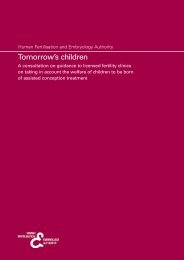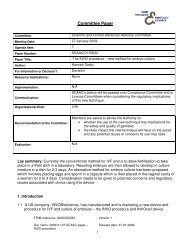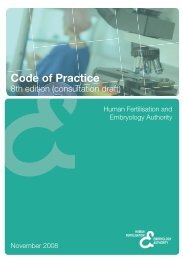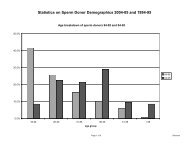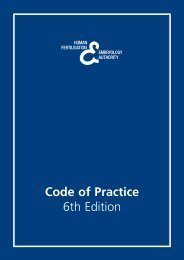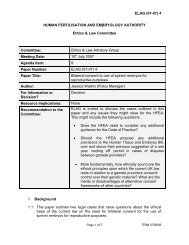Eighth Edition - R.3 - Human Fertilisation & Embryology Authority
Eighth Edition - R.3 - Human Fertilisation & Embryology Authority
Eighth Edition - R.3 - Human Fertilisation & Embryology Authority
You also want an ePaper? Increase the reach of your titles
YUMPU automatically turns print PDFs into web optimized ePapers that Google loves.
HFEA guidance (cont)<br />
Mandatory requirements (cont)<br />
(3) (cont)<br />
(c) P is likely at some time to have that capacity, and<br />
(d)<br />
the storage of the gametes is in P’s best interests.<br />
(4) Condition C is that, at the time when the gametes are first stored, P lacks capacity to consent to<br />
their storage.<br />
(5) Condition D is that P has not subsequently, at a time when P has capacity to give a consent<br />
under this Schedule–<br />
(a)<br />
given consent to the storage of the gametes, or<br />
(b)<br />
given written notice to the person keeping the gametes that P does not wish them to<br />
continue to be stored.<br />
(6) In relation to Scotland–<br />
(a) references in sub-paragraphs (3) and (4) to P lacking capacity to consent are to be read<br />
as references to P being incapable, within the meaning of section 1(6) of the Adults<br />
with Incapacity (Scotland) Act 2000, of giving such consent,<br />
(b)<br />
(c)<br />
the references in sub-paragraphs (3) and (5) to P having capacity are to be read as<br />
references to P not being so incapable, and<br />
that Act applies to the storage of gametes under this paragraph to the extent<br />
specified in section 84A of that Act.<br />
11 A person’s gametes must not be kept in storage by virtue of paragraph 9 or 10 after the<br />
person’s death.<br />
Interpretation of mandatory requirements<br />
The law allows gametes to be stored without consent if the conditions met in paragraph 9 or 10,<br />
and 11 of Schedule 3 of the HFE Act 1990 (as amended) are met.<br />
5G<br />
Gametes stored following the application of these paragraphs may be used only if the person from<br />
whom they were collected gives written effective consent to their use (and has sufficient capacity<br />
and competence to do so).<br />
5.30 Before storing someone’s gametes without their consent, the centre should judge that the person is not<br />
competent to consent to the storage of gametes. When assessing the competence of children and adults<br />
to consent, the centre should follow current guidance produced by the Department of Health, the General<br />
Medical Council and other professional bodies.<br />
5.31 The centre should presume that it is in the child’s best interests to store gametes unless circumstances<br />
suggest otherwise. When assessing whether it is in a child’s best interests to procure and store their<br />
gametes, the centre should refer to the General Medical Council guidance ‘0-18 years: guidance for<br />
all doctors’ and consider the child’s short- and long-term best interests. Consent should be sought<br />
from the child when they reach competence.<br />
5.32 The centre should provide written information that children and young people can read and understand<br />
easily. This information should be given by a member of staff experienced in communicating with children.<br />
<strong>Human</strong> <strong>Fertilisation</strong> and <strong>Embryology</strong> <strong>Authority</strong><br />
Guidance note | 5. Consent to treatment, storage, donation and disclosure of information<br />
Version 1.0


